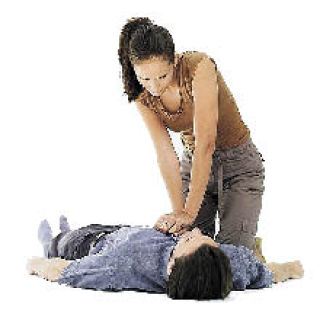Heart attacks and cardiac arrest are different and all should know
how to react if confronted with an emergency situation
Although many people believe a cardiac arrest and a heart attack are the same, they really are two different life-threatening medical emergencies that affect the heart.
During a heart attack, blood flow to part of the heart is blocked and that part of the heart muscle is damaged. The heart may then beat with an abnormal rhythm, but the heart doesn’t necessarily stop beating altogether.
In cardiac arrest, however, the heart does stop beating and the resulting loss of blood flow to the brain causes an immediate loss of consciousness. Cardiac arrest happens suddenly and it must be treated immediately by emergency procedures or death will follow shortly.
These factors can make someone more prone to cardiac arrest:
• Poor physical conditioning and obesity
• Smoking (especially heavy smoking for years)
• Poorly controlled high blood pressure
• Poorly controlled high cholesterol and triglyceride levels
The most common, immediate cause of cardiac arrest is ventricular fibrillation, a severely abnormal heart rhythm. Abnormal heart rhythms may result from abnormal electrical pathways in the heart caused, in turn, by a previous heart attack, high blood pressure or hereditary defects.
Other conditions that can cause cardiac arrest include severe allergic reactions, severe respiratory problems, drowning, electrocution, prolonged exposure to severe cold or abnormally high or low levels of electrolytes (such as potassium) in the blood.
The symptoms of cardiac arrest include unconsciousness, absence of a pulse and shallow or lack of breathing.
Quick action is essential after a person suffers a heart attack or cardiac arrest. With cardiac arrest, brain damage can occur within four to six minutes. If a person collapses at home, at work or in some other location away from the hospital, call 911 for emergency medical help. Also, cardiopulmonary resuscitation, or CPR, should be started.
Since many factors leading to heart problems can be controlled, it’s important that you seek medical advice early on. Talk with your doctor or health care provider about steps that you can take to improve your heart’s health.
About the writer: Dr. Berhan Ghermay is medical director for emergency services at Enumclaw Regional Hospital. The hospital, which celebrates its 60th anniversary this month, provides emergency medical care 24 hours a day, seven day a week.
A primer on emergency care
The first few minutes following a serious injury or a medical crisis are often the most important. The American College of Emergency Physicians has identified these warnings signs of a medical emergency:
Difficulty breathing, shortness of breath
Chest or upper abdominal pain or pressure
Fainting, sudden dizziness, weakness
Changes in vision
Confusion or changes in mental status
Any sudden or severe pain
Uncontrolled bleeding
Severe or persistent vomiting or diarrhea
Coughing or vomiting blood
Suicidal or homicidal feelings


